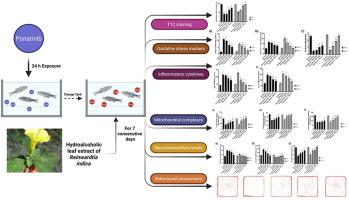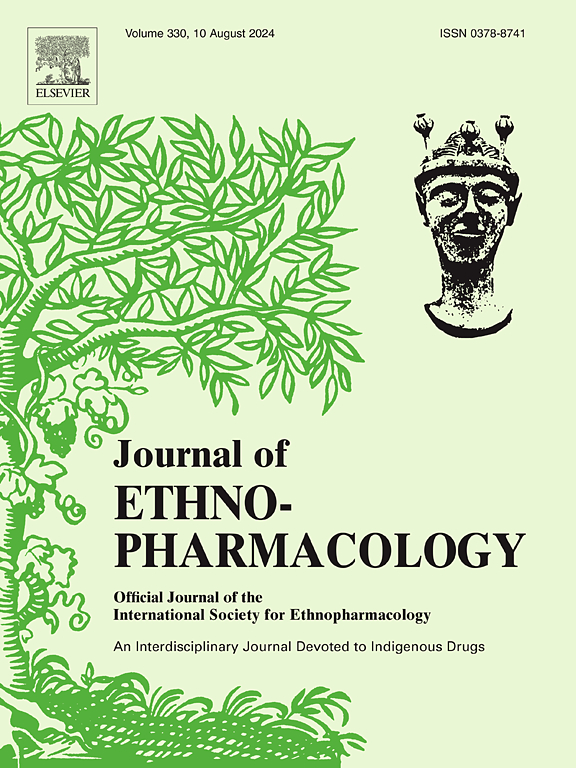Reinwardtia indica Dumort。通过减少氧化应激、神经炎症、线粒体功能障碍和神经递质失调,保护成年斑马鱼免受波纳替尼诱导的脑缺血:一种多靶点治疗策略。
IF 5.4
2区 医学
Q1 CHEMISTRY, MEDICINAL
引用次数: 0
摘要
民族药理学相关性:籼稻稻。在亚洲各国,特别是印度、尼泊尔和中国的传统医学体系中具有重要意义。这种植物在民间医学中被用来治疗各种疾病,治疗神经系统疾病,特别是瘫痪;处理伤口护理和各种皮肤状况;缓解头痛和背痛;并有助于消化不良等胃肠道问题。研究目的:本研究探讨了因其众多民族药理学用途而被广泛认可的药用植物印度红花对成年斑马鱼脑缺血性脑损伤的潜在神经保护作用。材料与方法:将斑马鱼置于波纳替尼诱导的缺血损伤24 h后,连续7 d给予红叶水酒精提取物处理。治疗后,对斑马鱼进行各种生化参数评估,包括氧化应激、神经炎症标志物、线粒体复合物和神经递质谱,以及存活率和脑损伤分析。此外,还分析了几种行为参数,如新坦克试验、明暗迷宫试验和开阔场地试验,以评估机车和认知障碍。结果:籼稻处理后显著减轻氧化应激,表现为降低脂质过氧化水平,提高SOD和过氧化氢酶的抗氧化酶活性。此外,提取物恢复线粒体功能,线粒体复合物水平增加。此外,籼稻治疗减轻了神经炎症,其特征是炎症细胞因子水平降低,即TNF-α和IL-1β。此外,籼米有效地恢复和正常化了关键神经递质的水平,如谷氨酸、GABA、乙酰胆碱、血清素、多巴胺和去甲肾上腺素,并改善了运动能力,减少了抑郁样行为,这一点从各种行为结果中可以看出。结论:这些研究结果表明,籼稻可能是一种有希望的治疗候选物,可以通过靶向行为改变、氧化应激、线粒体功能障碍和神经炎症来减轻脑缺血的有害影响。然而,在脑卒中及其他缺血性脑损伤的治疗方面,还有待进一步的研究。本文章由计算机程序翻译,如有差异,请以英文原文为准。

Reinwardtia indica Dumort. protects against ponatinib-induced cerebral ischemia in adult zebrafish via attenuation of oxidative stress, neuroinflammation, mitochondrial dysfunction, and neurotransmitter dysregulation: A multi-target therapeutic strategy
Ethnopharmacological relevance
Reinwardtia indica Dumort. holds substantial importance in traditional medicine systems across Asian countries, particularly in India, Nepal, and China. The plant has been utilized in folk medicine for treating a wide range of ailments, treating neurological disorders, particularly paralysis; managing wound care and various skin conditions; providing pain relief for headaches and backaches; and aiding in gastrointestinal issues such as indigestion.
Aim of the study
This study investigated the potential neuroprotective effects of R. indica, a medicinal plant well recognized for its numerous ethnopharmacological uses, against cerebral ischemia-induced brain damage in adult zebrafish.
Material and methods
Zebrafish were subjected to a ponatinib-induced ischemic insult for 24 h and afterwards treated with the hydroalcoholic leaf extract of R. indica for 7 consecutive days. After treatment, zebrafish were evaluated for diverse biochemical parameters, including oxidative stress, neuroinflammatory markers, mitochondrial complexes, and neurotransmitter profiles, along with survival rate and brain damage analysis. Furthermore, several behavioural parameters, such as novel tank test, light and dark maze, and open field test, were also analysed to assess locomotive and cognitive impairments.
Results
The results demonstrated that R. indica post-treatment significantly attenuated oxidative stress, as evidenced by reduced levels of lipid peroxidation and increased antioxidant enzyme activity of SOD and catalase. Additionally, the extract restored mitochondrial function, as indicated by increased levels of mitochondrial complexes. Furthermore, R. indica treatment reduced neuroinflammation, characterized by decreased levels of inflammatory cytokines, i.e. TNF-α and IL-1β. Furthermore, R. indica effectively restored and normalized the level of key neurotransmitters such as glutamate, GABA, acetylcholine, serotonin, dopamine and noradrenaline, along with improvement in locomotion ability and reduced depressive-like behaviours as evident by various behavioural outcomes.
Conclusion
These findings suggest that R. indica may be a promising therapeutic candidate for mitigating the detrimental effects of cerebral ischemia by targeting behavioural alterations, oxidative stress, mitochondrial dysfunction, and neuroinflammation. However, further research is warranted to explore the potential clinical applications of R. indica in the treatment of stroke and other ischemic brain injuries.
求助全文
通过发布文献求助,成功后即可免费获取论文全文。
去求助
来源期刊

Journal of ethnopharmacology
医学-全科医学与补充医学
CiteScore
10.30
自引率
5.60%
发文量
967
审稿时长
77 days
期刊介绍:
The Journal of Ethnopharmacology is dedicated to the exchange of information and understandings about people''s use of plants, fungi, animals, microorganisms and minerals and their biological and pharmacological effects based on the principles established through international conventions. Early people confronted with illness and disease, discovered a wealth of useful therapeutic agents in the plant and animal kingdoms. The empirical knowledge of these medicinal substances and their toxic potential was passed on by oral tradition and sometimes recorded in herbals and other texts on materia medica. Many valuable drugs of today (e.g., atropine, ephedrine, tubocurarine, digoxin, reserpine) came into use through the study of indigenous remedies. Chemists continue to use plant-derived drugs (e.g., morphine, taxol, physostigmine, quinidine, emetine) as prototypes in their attempts to develop more effective and less toxic medicinals.
 求助内容:
求助内容: 应助结果提醒方式:
应助结果提醒方式:


